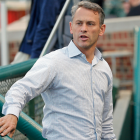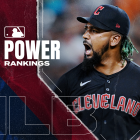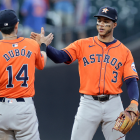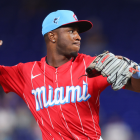
Earlier this week, Theo Epstein stepped down from his perch as the Chicago Cubs' club president, a job he had held for a bit over nine years. He has been replaced by Jed Hoyer, who had been with Epstein as the Cubs' general manager the entire stint in Chicago.
The job that faces Hoyer now is a difficult one.
First off, replacing a legend is always a tall order.
Now, let's be clear that Hoyer absolutely had a hand in the Cubs' success over the latter part of last decade. He deserves credit for that, but we all know the lion's share of the credit goes to the top dog, not the number two. The Golden Era in Cubs baseball was 2015-2020, even if there were sputtering ends to seasons in there. Before Epstein, Hoyer and company took over on the North Side, seeing a six-year stretch with zero losing records, five playoff berths, three division titles, three trips to the NLCS, a pennant and a World Series title was something Cubs fans dared not dream. Now the bar has been raised to the point that people are kicking and screaming about a four-year stretch that included two division titles, a trip to the NLCS and a 95-win season.
As such, Hoyer isn't just following in the footsteps of a legend, he's stepping into these newly formed expectations. This isn't the Cubs job Epstein took in 2011.
One might counter that it's not the roster -- in terms of lacking talent -- Epstein inherited either. That's true, but there are serious problems in the organization at this point. I discussed them at length after the Cubs were embarrassed in two games by the Marlins at Wrigley Field to bow out of the 2020 playoffs. Those included the financial situation imposed by ownership that is some parts of big individual player contracts, the pandemic taking away millions in revenue from the 2020 season and, likely, all the construction projects the Ricketts family has pursued around Wrigley Field the past handful of seasons. All of that comes together to paint a dire situation for the club moving forward.
Multiple reports throughout the offseason have stated the Cubs are signaling to teams that no trade is off the table. This could include players like Anthony Rizzo, Kris Bryant or Javier Baez, all of whom are only one year away from free agency. It could also include Willson Contreras, who has two years of control left. It could even include more highly priced pitchers Yu Darvish and Kyle Hendricks, each of whom have three years left on their deal.
Two quotes stand out from fellow executives, via MLB.com:
"They seem to think a heavy restart could be in order," a National League executive said. "Won't be easy, though, because of the money their guys are set to make. If someone can extend Bryant or Báez, they are probably still pretty good gets."
---
"They are open to all kinds of stuff," the NL executive said. "They aren't a group afraid to make big moves."
A "heavy restart" in the middle of a pandemic? Oh no, Cubs fans.
This could be a mess for a few years, in looking at the situation realistically. In dealing any of the above names, the Cubs would both be looking for financial relief and help to prop up their lacking farm system. With players only a year away from free agency, attempting to get both in return is mostly a fool's errand, considering none of those players at this point are the caliber of a Mookie Betts-type superstar. If dealing Darvish and/or Hendricks, there could be a nice return of prospects, but then the team is admitting it can't compete in the next three years, right?
The Cubs appear to be financially strapped enough -- according to ownership -- that there has been talk of the Cubs non-tendering (baseball speak for what other sports call "cutting") Kyle Schwarber or even Bryant. The whispers of possible extensions to players like Baez, Bryant or Contreras have gone away.
Even if ownership permitted Hoyer to simply run things back another year with essentially the same group, that team went 21-23 after a 13-3 start and was bounced in two games by the Marlins in the playoffs. In a longer season, things could well have gotten ugly (for more on the Cubs' current situation, check out my postmortem from October -- the only real difference is that Epstein is gone).
On the surface, it might seem like taking over the Chicago Cubs in this era is a cushy job, but Hoyer has been thrown into an incredibly difficult spot. He has to navigate an organization with little prospect currency, a flawed big-league roster with several players up against free agency in the near future, while also being tasked with slashing payroll -- all the while with heightened fan expectations and in the shadow of a legend.
It's become a bit of a tradition for higher-ups, instead of lamenting situations like this, to say that what they have in front of them is an opportunity. Hoyer certainly has that. He's facing an uphill battle here for the next several years, but he has the opportunity to forge his own path as a big-time executive. He'll need to be, in order to have the Cubs emerge successful through this next stretch.


















